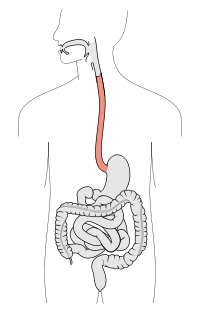
Photo from wikipedia
The ABC method is a classification method used for stratifying the risk of gastric cancer. However, whether the ABC method should be performed only once or multiple times throughout an… Click to show full abstract
The ABC method is a classification method used for stratifying the risk of gastric cancer. However, whether the ABC method should be performed only once or multiple times throughout an individual’s lifetime remains unclear. Therefore, this study aimed to analyze whether performing ABC screening twice in a lifetime is useful. We retrospectively analyzed the data of individuals who participated in health checkups in 2010 and 2015. We collected data on patient characteristics, pepsinogen levels, anti-Helicobacter pylori antibody titers, and the presence of gastric cancer. Overall, 7129 participants without a history of H. pylori eradication were included in this study. The participants’ average age in 2010 was 48.4 ± 8.3 years, and 58.1% were male. In addition, 11 and 20 cases of new H. pylori infection (0.15%) and spontaneous eradication (0.28%), respectively, were recorded. No significant difference was found in the incidence of gastric cancer between participants who underwent the ABC method once and those who underwent it twice (Group A: 0.16% vs. 0.16%; Group B: 0.47% vs. 0.39%; and Group C + D: 1.97% vs. 1.82%). Therefore, performing the ABC method twice, 5 years apart, does not significantly improve gastric cancer risk stratification.
Journal Title: Diagnostics
Year Published: 2023
Link to full text (if available)
Share on Social Media: Sign Up to like & get
recommendations!